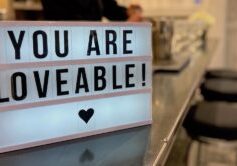Play Lesson
Ashton: Hi, I'm Ashton Gustafson, and welcome back to lesson three of the Loveable Mini-Course with Dr. Kelly Flanagan. Those of you of that have been with us, you know, in lesson one, we had a quick overview of the three essentials of a truly satisfying life. And then we started to dig into them, especially in lesson two we started to dig into worthiness with this idea that it isn't earned, it's remembered. And now here we are into lesson three. And it's called "Belonging: Don't find your friends, let them find you." So let's now join Dr. Kelly Flanagan.
Ashton: Okay, so Kelly, as we move into lesson three - belonging don't find your people, let them find you - my question is this, is it possible to remember your worthiness and still feel alone? Still struggle to find that belonging in the world? Because we're talking through these steps. There's a progression here. Is it possible to remember your worthiness and still feel alone?
Kelly: Yeah, I do think it is. As I've spent years now with people talking about these ideas, I've discovered that a lot of people find themselves in what feels like a no-man's land between worthiness and belonging. And I speak to it a little bit in Loveable, but I'm excited to get to talk more about it here. It's encapsulated by this sort of joke or anecdote that's told by this theologian and philosopher Peter Rollins. And it goes something like this. A man calls up a psychoanalyst and says, "Doctor, I need your help. I think I'm chicken feed on the ground, and it's a terrifying way to live. Can you help me with that?" The psychoanalyst says, "Yeah I can try, so why don't you come on in?" So the man goes in, you know, it's psychoanalysis, so five days a week for several years, and after a few years, the doctor says, "I think you're cured. I think we can discharge you. You know you're not chicken feed on the ground. You know who you are. You're a human being. And you're good to go." And so they discharge him. And about a week later, the doctor gets a call from the man, and the man says, just frantic, says, "Doctor, I need to come in right away. I have new neighbors who've moved in and they have chickens." And the doctor says, "Well, I don't understand, you know, you're a human being." And the guy says, "I know I'm a human being. But do the chickens know?" And I think that's the place that initially we find ourselves as we're rediscovering our sense of worthiness. It's like, I know I'm worthy of love and belonging. But do the people out there know, are they going to treat me like I'm worthy of love and belonging?
Ashton: Another vote of confidence.
Kelly: That's right. Are they going to peck at me like I'm chicken feed on the ground and that's going to hurt? And so there's this really brave moment, I think, for most people where they've begun to re-embrace their sense of worthiness, and they have to step out on faith, trusting that when they do, it's not going to all feel great. There's going to be tough moments. There's going to be people who do peck at them. But in the process that they're going to be sort of starting to discover the people who really see them for who they are and appreciate it.
Ashton: Yeah. You and I have geeked out for years over the dialogue of true self/false self. And in lesson two, I think is kind of the discovery, the rediscovery, the remembering of the true self. And it was my introduction to the true self that really introduced me to the false self.
Kelly: Right on. That's it.
Ashton: In Loveable, you call the false self the ego castle. Talk to me about that metaphor, this language that we use when we talk about false self.
Kelly: Well, it's so important what you just said, that for a lot of us, our introduction to our false self is the true self. It's like you can't see the false self until you've retreated a little bit from it.
Ashton: I didn't know I had that because this is all I ever thought I was.
Kelly: Exactly. It'd be like you awoke into consciousness as an actor on a stage and you thought you were the part that you were playing the whole time. And then someone says, "Cut, take it again," and you're like, "Oh, wait. I'm not that? I'm Joe Smith, who has another life out here?" And I think that's important because it's hard enough to release the false self. But if you don't have something else that you're settling into, as you do, I just don't know that it's possible to exist. So that's why the worthiness piece comes first, and then so much of finding belonging is now about learning how to live and love from that true self rather than the false self that we've been living and loving from all the time. So you've got a lot of habits to break. You've got a lot of relational patterns to disrupt. And those are really ingrained. And so this is not an overnight process. It's a lifelong process now, learning how to show up as I truly am and not enacting all the patterns of the false self. And as you said, we call it the ego castle in Loveable. And I think that metaphor is one that has sort of outpaced others. You know, you try to talk about the ego in various ways because it's sort of abstract, and it's the one that always seems to be most helpful to people. Most practical. And the idea is that if we could go back to that moment where shame really took hold and we said, "Uh oh, my true self isn't good enough for love and belonging, I need to build a self that goes out into the world and gets me the love and belonging I so badly want," that the first layer of false self that we add to our ego is like a wall on a castle, and it sort of hides us away, hides our true self away. "I don't want anybody to see that because it seems like when they do, I get I get shamed for it," so I want to now hide that away and sort of blend into the scenery. Right? It's where you see kids in around 3rd or 4th grade start to wear the same clothes as everybody else. And form cliques. These are ego walls beginning to be built. And then somewhere around middle school, usually, and this is why junior high is just a brutal place to be, we add cannons to the ego walls. And these are the more aggressive, mean, critical, angry things that we do to sort of basically strike first before we can get struck. And then somewhere in early adulthood, usually when we started to have some success and we've gotten our feet underneath us, we add ego thrones to this ego castle. And these are the things that we've done, where we've established, like, hey, I've proven I'm worthy now. "Look what I've done. Look what I've accomplished. Look what I have." And so we really spend, I think, from about third or fourth grade through early adulthood, building this false self.
Ashton: Some through their sixties, seventies, and eighties.
Kelly: If you want to define, what is a midlife crisis, it's a moment of decision. Do I double down on my false self, or do I begin to release that false self and return to my true self? I mean, it's almost always that. So let's say through midlife, oftentimes, we're building that false self. And then there comes this opportunity to begin to release that and figure out how to show up to your people as your true self and see who says, "Hey, man, been waiting for you. Great to see you. I'm your ride or die, let's do this." And so it's a pretty intense time of life, but what comes out of it is a true sense of belonging.
Ashton: Yeah, and I think the language of walls, cannons, thrones. Those are good filters. And again, this is an awareness that has to be cultivated. But am I getting behind a wall? Am I loading the cannon? Am I standing on my throne? Great red flags, am I trying to protect something?
Kelly: That's right.
Ashton: Because - language that you and I are robbing from a whole lineage of folks that we stand behind - the true self is unoffendable. The true self is never not at rest.
Kelly: That's right.
Ashton: It's never not at peace, it's eternal okayness. And so I think that, like, that's language that really helps me, right? When the heart starts to beat a little bit faster, the face turns red, the palms sweat. Is there a wall? Is there a cannon, or am I, you know, standing on a throne? Probably a good red flag to go, "Hey, who's here? The one that is true. The one that is eternally okay. Or the one that always is easily offended and has to protect something."
Kelly: That is such a valuable teaching. I do get the question, "Okay, well, now that I am aware I have a false self, an ego castle, what do I do?" And one of the more basic recommendations that I make is: the first thing you do in the morning and the last thing you do at night is flip through your phone - you flip through your apps - but what if instead you flip through your ego? So at night, you go, "Where did I show up behind my walls today, or not show up behind my walls? Where did I man my cannons? Or as my wife says, archers, because women are more likely to use precision strikes that cut close to the bone. And where did I sit on my throne? And do that self-inventory. And then in the morning, ask yourself the same thing, "Am I waking up behind a wall, behind a canon, on a throne?" And you'll be amazed, it'll be different than where you ended up the night before. But, boy, what a better start to your day to say, "Now I have a moment of choice." I think, it was Victor Frankl who said, between every stimulus and response, there's a moment of choice.
Ashton: Yep, there lies our destiny.
Kelly: You've got it. And so if you can just create that moment of choice by going, "I'm waking up behind my canon, I just want to fire somebody today," you now have a choice to live from true self instead. So I think that is a super valuable teaching. And I'll tell you, my New Year's resolution this year - first time I've ever carried a New Year's resolution past about January 4 - was to be mindful of when I feel my heart closing and open it back up. And everything you described in that teaching you just gave us about that, like, you can feel it's a bodily experience when you start protecting, right?
Ashton: Yep, somatic.
Kelly: Somatic. You can feel a shutting down, if you notice that happening, you're witnessing your false self take over. You're feeling in danger and you're going to need protection, so your false self is going to take over. And now you created another moment of choice. Can I open that space back up within me with a breath, with just a moment of stillness? Can I think, how would my true self, which is always eternally okay, how would it engage in this moment if I could trust that that was true? And so that's been a very valuable practice for me this year.
Ashton: I mean, even just the invitation of becoming Steady Eddy, a little bit more Steady Eddy in your life, who of us cannot use that?
Kelly: Absolutely.
Ashton: And I think that that is the discovery, the rediscovery, the consistent remembering. It's work. But as we cultivate that space, I think that's what you get once again, lighter and brighter.
Kelly: That's right. It's the work of awareness which always leads to that lightness.
Ashton: The great predecessor as I call it.
Kelly: The great predecessor. I love that.
Ashton: So this lesson is called "don't find your people, let them find you." In light of this ego castle that we just described. What do you mean by "don't find your people, let them find you."
Kelly: Well, the lovely thing about it every castle has got a drawbridge, and that drawbridge is controlled from the inside.
Ashton: Imagine that.
Kelly: Imagine that. No one can really connect with you until you lower that drawbridge and come out and show people who you are. And what I've discovered over time in working - well, in my own journey and working with folks - is that really most of the work of belonging is learning how to lower that drawbridge, stepping out of the ego, stepping out of the protections, and showing up authentically. And what you have an opportunity to do in that moment is look around and see who else has done the same thing. Like, who else has got their drawbridge down and is showing up authentically. And amongst those people, who do you resonate with? And the lovely thing in that moment is, probably not everybody. And it's okay. There's nothing on the line here. I'm showing up authentically and you're showing up authentically. I'm not sure we'll spend a ton of time together, but, "Oh you? We seem to vibe on this." And there's no rejection in this. And so the clarity that you begin to get about your circles of belonging, as you find each other and begin to recognize each other in your authenticity, simplifies the entire process. It takes a lot of the stress and the danger out of this process of finding belonging.
Ashton: You lose that need to have your personal like button.
Kelly: That's right.
Ashton: Your need to be retweeted. That becomes less and less interesting. And the camaraderie and the community, it's just a natural byproduct. Flow, not force.
Kelly: That's right.
Ashton: If there's one thing the true self is trying to get us all to understand, saddle up with flow and put force on the sideline, because everything you're trying to force in life is not going so well. But that which you allow to just flow, beautiful things happen.
Kelly: It's interesting, as I practice that practice of open up your heart this year, the number one most common awareness I have in that moment is I'm trying to force something in a relationship, and I'm not just letting it flow. So what would it look like to let it flow right now? That is right on. What a wonderful teaching.
Ashton: So you kind of make it sound easy, but is finding our belongings, like, mostly just fun and games. Or really, what are we getting at here in this lesson?
Kelly: Well, I mean, I think there is some relief, like you said, some lightness in terms of: you might find a person, for instance, who is not very interested in you, and you go, "I get it, I'm not their flavor." And there's no pressure to force those things to happen. So there's a lightness that comes with it. But I also think the reality is most of us, when we remember our true self, lower that drawbridge, and step out authentically, there are going to be plenty of people in our lives who don't recognize us and sort of maybe want us to go back in the castle because there were some ways that that was working for them, right? And so what you see, and this is the hard part - I think it's the hardest part about finding belonging - is that you will see some of your circles of belonging shrink at first. You'll see some things, some relationships that maybe you thought were going to last for the long haul, not last. And this is a painful thing - and we're going to have to give it relatively short shrift here in this lesson - but it's something to be digging into with our Loveable Learning Community about: how do I discern this? What's that process like? But there is a stretch here where there are some relationships that fall by the wayside and, in a lot of ways, that's okay. Because again, we have a limited amount of time. Those people need to go find the people that they truly belong to, so that you can go find yours.
Ashton: The doorways of great love and great suffering. We haven't all experienced those. And that was one hard lesson that I had to learn, right? You enter into some of these new realms, new worlds you're seeing with new eyes, and you've tasted something that someone else hasn't. And there's a bit of an angst there. Why can't they taste this? And they haven't seen what you have seen. Why aren't they seeing? That's some camouflaged ego work that has to be done there. But I think when you can once again stand back in between that stimulus and the response, just know your need to fast forward everyone to where you are is also another ego flex. Ego just becomes more and more clever, the more and more you get to know how he operates in your life.
Kelly: And I love what you just said because it's important to acknowledge that ego doesn't, you know, you don't tear down a castle. You don't knock it down and obliterate it forever. You're sort of in this dance of moving in and out of it, trying to live outside of it as much as possible. But it has clever ways of reasserting itself and inviting you back in. So yeah that dance with the ego and with the true self, that's what it's all about when we're finding belonging.
Ashton: Right on. Beautiful lesson on belonging and looking forward to get into lesson four: purpose, the thing you never knew you always wanted to do.





